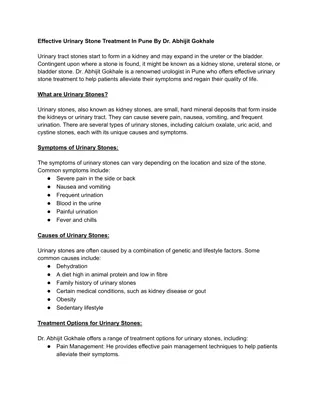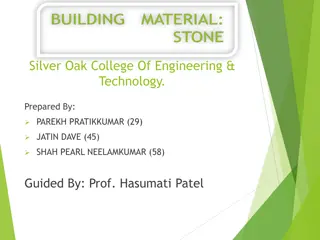Understanding Construction Materials: Stones in Civil Engineering
Stones play a crucial role in construction as building materials. This presentation covers the introduction, requirements, types, properties, and importance of stones in civil engineering, emphasizing factors such as structure, appearance, weight, durability, and strength.
Download Presentation

Please find below an Image/Link to download the presentation.
The content on the website is provided AS IS for your information and personal use only. It may not be sold, licensed, or shared on other websites without obtaining consent from the author. Download presentation by click this link. If you encounter any issues during the download, it is possible that the publisher has removed the file from their server.
E N D
Presentation Transcript
Presentation by, Hitesh Ganatra Dept:Mechanical Sub: Elements of civil engineering Sub code:2110004 Roll no:209 Enroll no:131080119012 Amiraj College of Engineering & Technology 8/25/2024 Construction materials:Stones 1
Contents Introduction of stones Requirements of stones Types of stone Uses of stones Properties of stones Test Importance of stones 8/25/2024 Construction materials:Stones 2
Introduction of stones Stones are obtained from naturally occurring rocks. By blasting of rocks the stones are obtained in the form of blocks , slabs and broken pieces. Shaping and dressing of stones are essential to use them as building construction materials. Example:- Basalt,trap,chalk,granite,kankar,limestone,marble,san dstone,slate. 8/25/2024 Construction materials:Stones 3
Requirements of stone 1)Structure:- They may be crystalline or amorphous . Unstratified rocks are good as building stones. 2)Appearance- Colour Texture:-stones of light shades may be preferred to dark coloured stones. 3)Weight:-Light weight stones are preferred for domes and arches .A heavy stones is compact with very little porosity which contributes to structural stability. 8/25/2024 Construction materials:Stones 4
4)Fineness of Grains:-For molding and carving works fine grained stones are very suitable 5)Durability:-Stones must have the property to resist loads, chemical action of atmosphere,rain,water,snow etc 6)Strength:-A stone for building work should have minimum 100 to 350 N/mm*mm crushing strength. Igneous rocks have 100 to 350 N/mm*mm crushing strength Sedimentary rocks have low crushing strength 8/25/2024 Construction materials:Stones 5
7)Hardness:-Stones should have good resistance against wear and tear. 8)facility of working and dressing:-Stones for buildings must be such that they can be cut to required size. 8/25/2024 Construction materials:Stones 6
Types of Stones Geological, formation. Chemical composition Structure Igneous, Stratified, Siliceous, Sedimentary, Un-stratified, Argillaceous, Metamorphic Foliated Calcarious 8/25/2024 Construction materials:Stones 7
Geological formation 1)Igneous rocks 8/25/2024 Construction materials:Stones 8
2)Sedimentary rocks 8/25/2024 Construction materials:Stones 9
3)Metamorphic rocks 8/25/2024 Construction materials:Stones 10
General structure 1)Stratified 8/25/2024 Construction materials:Stones 11
2)Unstratified 8/25/2024 Construction materials:Stones 12
3)Foliated 8/25/2024 Construction materials:Stones 13
Chemical composition 1)Siliceous 8/25/2024 Construction materials:Stones 14
2)Argillaceous 8/25/2024 Construction materials:Stones 15
3)Calcareous 8/25/2024 Construction materials:Stones 16
Uses of stones 1)They are used in foundation,walls,columns,arches,cornices,bed blocks etc. 2)They are used in ornamental features and to provide fine smooth faces of walls. 3)They are used in hydraulic structures like dams and bridges. 4)They are used in retaining wall masonry to retain soil. 8/25/2024 Construction materials:Stones 17
Uses(Continue) 5)They are used as road metal in road construction. 6)They are used as ballast for permanent way in railways. 7)They are used to make concrete in the form of coarse aggregate. 8/25/2024 Construction materials:Stones 18
1)Siliceous rocks are hard and durable.they are not easily affected by weathering actions. 2)Argillaceous rocks may be dense and compact or they may be soft. 3)The durability of calcareous rocks will depend upon the constituents present in surrounding atmosphere. 4)Marble and quartzite have compact crystalline structure. 5)Sandstone and gneiss have granular crystalline structure .crystals are of similar size. 8/25/2024 Construction materials:Stones 19
6)igneous rocks contain many minerals. various minerals having wind range of different distinctive characteristics. 8/25/2024 Construction materials:Stones 20
Tests 1)acid test-resistance to acids and chemicals. 2)attrition test-rate of wear of stones. 3)crushing test-compressive strength 4)crystallization-structure 5)freezing and thawing test-effect of wind , sun rays, rain etc. 6)hardness test-to determine hardness 7)Impact test-To determine toughness 8/25/2024 Construction materials:Stones 21
8)Microscopic test- Grainsize , texture , mineral constitutions,existence of pores,fissures,veins and shakes. 9)Smith s test-For presence of soluble matter 8/25/2024 Construction materials:Stones 22
Importance of stones Stones should be placed in walls with the direction of their natural beds as horizontal In stone masonry , the direction of natural bed of all sedimentary stones should be perpendicular to the direction of pressure such an arrangement gives maximum strength to stonework 8/25/2024 Construction materials:Stones 23
Use in Construction Name Type Use Granite Igneous Steps, Facing walls, Floors, Kitchen Platform Basalt Igneous Foundation, Road metal, Ingredient of concrete Rough Masonry Gneiss Metamorphic Laterite Metamorphic masonry Marble Metamorphic Ornamental work, facing wall, kitchen platform Roofs & sills Slate Metamorphic Limestone Sedimentary Footing, Paving & Flooring Sandstone Sedimentary 8/25/2024 Facing wall, floors, walls, ornamental works Construction materials:Stones 24
8/25/2024 Construction materials:Stones 25






















